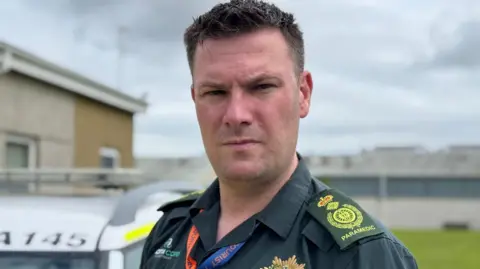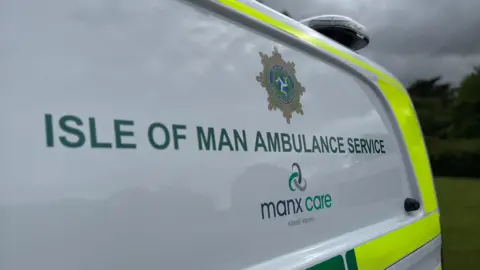'Art and science' to TT emergency care planning
 BBC
BBCThere is an "art and science" to planning the emergency healthcare response to the annual TT festival, the man tasked with running the ambulance service has said.
More doctors, nurses, surgeons, and ambulances are available over the fortnight on the Isle of Man, which runs until 7 June.
Manx Care's director of ambulance services Will Bellamy said there was ongoing forward thinking to factor in what marks the health care provider's busiest time.
He said: "It's a massive influx of population to the island and we factor that into our planning."
As well as an increase of on-call and on-duty staff within Manx Care, Mr Bellamy said a further eight members of "mutual aid" had come over from the south east coast ambulance service.
While the local team would receive an average of 500 calls to 999 over a two-week period, during the TT fortnight that rose by about 200, he said.
'Myriad of procedures'
Over the racing fortnight elective surgeries are paused to enable extra capacity for trauma care at Noble's Hospital.
Mr Bellamy explained that there were additional doctors and nurses on shift within the minor injuries units and emergency department, as well as more surgeons, to cope with the potential increase on services.
There were also extra teams to operate aircraft to transport patients to hospitals in the UK whenever needed, with daily discussions held with tertiary specialist hospitals about available capacity, he said.

Throughout most of the year there are four frontline ambulances on duty during the day, and three at night on the island.
But Mr Bellamy said that increased to seven during the day and five overnight during the TT process.
He said while you could not predict the number of incidents any one year, there was an "art and science to be applied".
He said the "art" came from years of history and experience knowing "where accident black spots will be".
The science was looking at the data, especially 999 calls, "to come up with an activity plan and a response plan for the island", he continued.
Mr Bellamy also offered a reassure local residents and visitors that if anyone fell ill during the TT, especially during racing, that there were "a myriad of procedures to get around this island" and no one should delay calling them.
"Whether we come to you via cars, ambulances, or we come to you in the air via a helicopter, it's all been part of our planning," he added.
Read more stories from the Isle of Man on the BBC, watch BBC North West Tonight on BBC iPlayer and follow BBC Isle of Man on Facebook and X.
